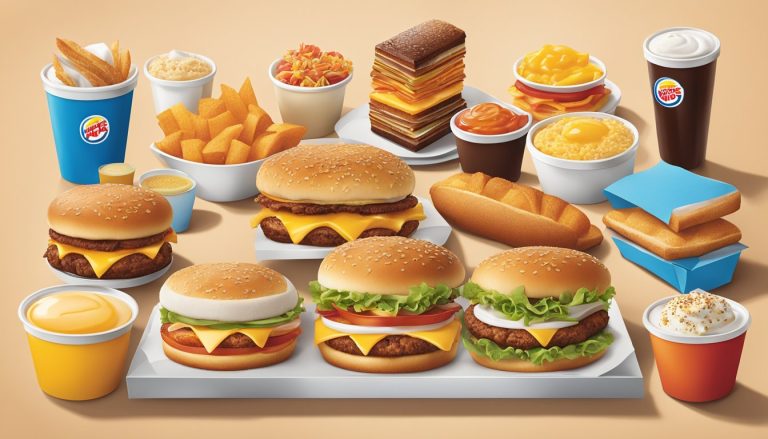Burger King’s breakfast offerings have evolved significantly since their introduction, with franchisees playing a crucial role in shaping the menu and driving growth. The fast food giant’s morning meal options have expanded from simple coffee and pastries to a diverse range of sandwiches, platters, and beverages. Franchisees have been instrumental in developing and testing new breakfast items, providing valuable feedback on local customer preferences and market trends.
The launch of the BK Café platform in 2019 marked a significant step in Burger King’s efforts to boost its breakfast business. This initiative, which included a $5 monthly coffee subscription, aimed to attract more morning customers and compete with rival chains. Franchisees have embraced this strategy, working to implement the new offerings and promote them to their local customer base.
As Burger King continues to expand its breakfast menu and enhance its morning service, franchisees remain at the forefront of innovation and customer engagement. Their on-the-ground insights and ability to adapt to local tastes have proven invaluable in tailoring breakfast offerings to meet diverse consumer demands across different regions.
Historical Context of Burger King Franchising

Burger King’s franchising journey began in the 1950s and evolved through various ownership changes. The company’s approach to franchising shaped its growth and menu offerings over the decades.
Origins of Insta-Burger King
Insta-Burger King, founded in 1953 in Jacksonville, Florida, marked the beginning of Burger King’s story. Keith J. Kramer and Matthew Burns started the company, introducing a unique cooking device called the Insta-Broiler.
In 1954, James McLamore and David Edgerton opened the first franchise in Miami, Florida. They saw potential in the concept but made crucial changes.
The partners rebranded the company as “Burger King” and introduced the flame broiler cooking method. This innovation became a signature element of Burger King’s offerings.
Pillsbury and Grand Metropolitan Era
Pillsbury Company acquired Burger King in 1967, ushering in a period of rapid expansion. The new ownership focused on growing the franchise network across the United States.
During this time, Burger King introduced several iconic menu items, including the Whopper. Franchisees played a key role in menu development and regional adaptations.
In 1989, Grand Metropolitan PLC purchased Pillsbury, gaining control of Burger King. This era saw further international expansion and menu diversification.
Transition to Diageo and Modern Franchising
Diageo formed in 1997 through the merger of Grand Metropolitan and Guinness. Under Diageo, Burger King continued to evolve its franchising model.
The company implemented new franchise agreements and modernized restaurant designs. This period also saw increased focus on breakfast offerings, with franchisees contributing to menu innovations.
In 2002, Diageo sold Burger King to a consortium of private equity firms. This transition marked the beginning of Burger King’s modern franchising era, characterized by more aggressive expansion and menu experimentation.
Understanding BK Franchisees

Burger King franchisees play a crucial role in the company’s operations and success. These individuals own and operate individual restaurant locations, adhering to Burger King’s established standards and procedures.
Role and Responsibilities
Franchisees are responsible for day-to-day restaurant management, including staffing, inventory control, and customer service. They must maintain consistent quality and uphold Burger King’s brand standards across all aspects of their operations.
Franchisees also handle local marketing efforts and community engagement. They work to build relationships with customers and promote Burger King’s products in their area.
Financial management is another key responsibility. Franchisees oversee budgeting, cost control, and profit maximization for their locations.
Franchise Agreements and Regulations
Burger King franchise agreements outline the terms and conditions for operating a restaurant under the brand. These contracts typically cover licensing fees, royalty payments, and operational requirements.
Franchisees must adhere to strict regulations regarding food safety, hygiene, and quality control. Regular inspections ensure compliance with company standards and local health regulations.
The agreements also specify territory restrictions, preventing franchisees from competing with other Burger King locations. Franchisees receive ongoing support and training from Burger King corporate to help them succeed in their operations.
The Role of Franchisees in Menu Design
Franchisees play a crucial role in shaping Burger King’s menu offerings, particularly for breakfast and specialty items. Their input and local market knowledge help tailor menus to regional preferences and customer demands.
Expanding the Breakfast Menu
Franchisees have been instrumental in expanding Burger King’s breakfast options. They provide valuable feedback on customer preferences in their local markets, helping to identify popular items and regional tastes.
Some franchisees have suggested new breakfast sandwich combinations, leading to menu additions like the Croissan’wich and French Toast Sticks. These innovations have become staples of BK’s morning offerings.
Franchisees also influence portion sizes and pricing strategies for breakfast items, ensuring they meet both customer expectations and profitability goals.
Influence on Specialty Sandwich Line
BK’s specialty sandwich line has benefited greatly from franchisee input. Franchisees often propose new flavor combinations or ingredients based on local trends and customer requests.
Several successful specialty sandwiches, such as the Rodeo Burger and the Angry Whopper, originated from franchisee suggestions. These unique offerings help differentiate Burger King from competitors and cater to diverse tastes.
Franchisees also provide feedback on the operational aspects of new specialty items, ensuring they can be efficiently prepared without disrupting kitchen flow. This collaboration helps BK maintain quality and consistency across locations while introducing innovative menu options.
Marketing Strategies and Competition
Burger King employs diverse marketing tactics to boost its breakfast offerings and compete in the fast food industry. The company focuses on creative advertising, leverages multiple media channels, and adapts to changing consumer preferences.
Capturing Market Share Through Advertising
Burger King utilizes bold advertising campaigns to promote its breakfast menu and gain market share. The company often employs humor and wit in its ads to stand out from competitors. BK’s marketing teams work closely with franchisees to create region-specific promotions that resonate with local customers.
Promotional deals, such as “2 for $4” breakfast sandwiches, aim to attract value-conscious consumers. Limited-time offers on new breakfast items generate buzz and encourage trial. Burger King also partners with popular brands for co-branded products to expand its appeal.
Leveraging TV Commercials and Social Media
Television commercials remain a key component of Burger King’s breakfast marketing strategy. The brand creates memorable ads featuring its mascot, the King, to promote breakfast offerings. These commercials often air during morning shows and primetime slots to maximize visibility.
On social media, Burger King engages followers with breakfast-themed content and interactive campaigns. The company uses platforms like Twitter and Instagram to showcase new menu items and respond to customer feedback. User-generated content and influencer partnerships help extend the reach of BK’s breakfast promotions online.
Navigating Competition in the Fast Food Industry
Burger King faces stiff competition in the breakfast segment from rivals like McDonald’s and Wendy’s. To differentiate itself, BK focuses on unique menu items such as the Croissan’wich and breakfast burritos. The company also emphasizes its flame-grilled cooking method as a point of distinction.
Price wars are common in the fast food breakfast market. Burger King adjusts its pricing and offers strategic discounts to remain competitive. The brand also invests in improving food quality and expanding healthier options to meet evolving consumer demands.
Franchisees play a crucial role in executing local marketing initiatives and providing feedback on breakfast menu performance. This collaborative approach helps Burger King refine its breakfast offerings and marketing strategies to better compete in various markets.
Global Expansion and International Markets
Burger King’s global expansion strategy leverages franchisees to penetrate international markets. This approach allows for localized expertise while maintaining brand consistency across diverse regions.
Tailoring the Menu for Global Tastes
Franchisees play a crucial role in adapting BK’s breakfast offerings to local preferences. In India, vegetarian options like the Veg Whopper dominate the menu. Japanese locations offer teriyaki-flavored items.
Middle Eastern franchises incorporate halal meat and region-specific spices. European outlets emphasize fresh, locally-sourced ingredients to appeal to health-conscious consumers.
This customization extends to breakfast items. In the UK, franchisees introduced a full English breakfast sandwich. Brazilian locations serve pão de queijo alongside traditional items.
Challenges and Opportunities Abroad
Expanding into international markets presents both hurdles and potential rewards for BK franchisees. Cultural differences and varying consumer habits require careful navigation.
Regulatory compliance poses challenges, especially regarding food safety and labeling. Some countries have strict rules on ingredient sourcing and nutritional information disclosure.
Economic fluctuations and currency risks can impact profitability. Franchisees must adapt to local economic conditions while maintaining brand standards.
Competition from established local chains and other global players intensifies in many markets. This necessitates innovative marketing strategies and menu adaptations to stand out.
Despite these challenges, international expansion offers significant growth opportunities. Emerging markets with rising middle classes present untapped potential for BK’s breakfast offerings.
Operational Excellence and Customer Experience
Burger King franchisees play a crucial role in delivering consistent quality and exceptional customer experiences across all locations. Their commitment to operational excellence directly impacts the brand’s reputation and customer satisfaction.
Maintaining Consistency Across Locations
Burger King franchisees strive to maintain uniformity in food quality, service standards, and store ambiance across all U.S. locations. This consistency is essential for building customer trust and loyalty.
Franchisees follow strict guidelines for food preparation, ensuring that menu items like the Croissan’wich and hash browns meet Burger King’s specifications. They also adhere to standardized training programs for staff, promoting consistent service quality.
Regular audits and inspections help franchisees maintain compliance with brand standards. These assessments cover food safety, cleanliness, and service speed, ensuring a uniform experience for customers regardless of location.
Enhancing the In-Store Experience
Franchisees focus on creating welcoming environments that encourage repeat visits and positive word-of-mouth. They invest in modern, comfortable seating areas and ensure cleanliness throughout the restaurant.
Digital menu boards and self-service kiosks are implemented to streamline ordering processes and reduce wait times. These technologies also allow for dynamic menu updates, showcasing breakfast specials and promotions effectively.
Franchisees train staff to be friendly, attentive, and knowledgeable about breakfast offerings. Employees are equipped to handle customer inquiries and provide recommendations, enhancing the overall dining experience.
Special attention is given to drive-thru operations, as many customers prefer this convenient option for breakfast. Franchisees optimize drive-thru layouts and processes to ensure quick and accurate service during peak morning hours.
Resource Allocation and Economies of Scale

Franchisees play a crucial role in Burger King’s ability to leverage economies of scale for breakfast offerings. Their collective purchasing power and shared resources enable cost-effective operations and marketing initiatives.
Sourcing and Supply Chain Management
Burger King franchisees benefit from centralized sourcing of breakfast ingredients and supplies. This consolidated approach allows BK to negotiate better prices with food suppliers due to higher volume orders. The company’s scale enables it to secure favorable contracts for eggs, bacon, coffee, and other breakfast staples.
Franchisees tap into BK’s established supply chain network, reducing individual logistics costs. This shared infrastructure helps maintain consistent quality across locations while minimizing expenses. The efficiency gains from economies of scale in procurement and distribution directly impact franchisees’ bottom lines.
Investment in Marketing and Advertising
Pooled marketing resources give Burger King franchisees access to national advertising campaigns they couldn’t afford individually. The company’s scale allows for prime-time TV spots, digital marketing, and high-profile sponsorships to promote breakfast offerings.
Franchisees contribute to a collective advertising fund, which BK leverages to create professional marketing materials and run large-scale promotions. This shared approach to the marketing mix amplifies brand awareness for breakfast items across all locations.
Local franchisees can also tailor national campaigns to their specific markets, maximizing the impact of advertising dollars. The combination of national reach and local customization helps drive breakfast traffic to individual restaurants.
Strategic Analysis and Foresight
Burger King franchisees play a crucial role in analyzing market conditions and anticipating future trends to shape successful breakfast offerings. Their insights help inform strategic decisions and position BK for growth in the competitive breakfast segment.
Conducting SWOT Analysis for Growth
Franchisees regularly conduct SWOT analyses to identify strengths, weaknesses, opportunities, and threats related to BK’s breakfast menu. Strengths often include BK’s brand recognition and existing customer base. Weaknesses may involve limited healthy options or inconsistent quality across locations.
Opportunities can arise from changing consumer preferences, such as demand for plant-based items. Threats typically include aggressive marketing from competitors and economic downturns affecting discretionary spending. This analysis informs menu innovations and marketing strategies to capitalize on strengths and address weaknesses.
Staying Ahead of Market Trends
BK franchisees closely monitor emerging breakfast trends to maintain market relevance. They track shifts in consumer behavior, such as increased interest in grab-and-go items or all-day breakfast options. Franchisees analyze sales data to identify popular menu items and underperforming offerings.
They also study competitors’ moves and industry reports to spot potential gaps in the market. This foresight allows franchisees to propose menu updates, pricing adjustments, and promotional strategies to BK corporate. By staying proactive, franchisees help BK adapt its breakfast offerings to meet evolving customer needs and maintain its market share in the fast-food breakfast segment.
Product Innovation and Differentiation
Burger King franchisees play a crucial role in shaping breakfast offerings through product innovation and differentiation strategies. Their efforts focus on exploring new dietary trends and developing unique menu items to attract customers.
Exploring New Dietary Trends
Franchisees actively research emerging food preferences to stay competitive. They analyze local market data and consumer feedback to identify potential new breakfast options. This insight helps BK introduce items that cater to health-conscious customers, such as low-carb or plant-based alternatives.
Some franchisees experiment with regional flavors to create localized breakfast dishes. This approach allows Burger King to offer variety while maintaining its core menu.
Developing Unique Offerings
Franchisees contribute ideas for new breakfast products that set Burger King apart from competitors. They propose creative combinations of ingredients to craft distinctive sandwiches and platters.
Notable innovations include:
- Breakfast Chicken Tenders: A twist on the classic chicken tender, seasoned for morning palates
- BK Broiler Breakfast Sandwich: Adapting the popular BK Broiler for early risers
- Value Menu Breakfast Items: Affordable options to attract budget-conscious customers
Franchisees also focus on improving coffee offerings, recognizing its importance in the breakfast market. They work with suppliers to develop unique blends and introduce specialty drinks to compete with coffee-focused chains.




